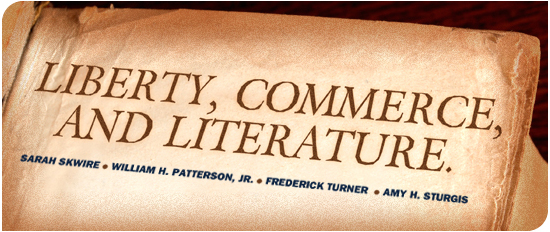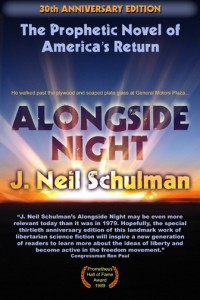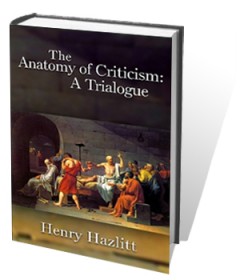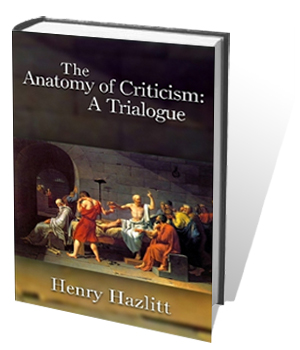Koch Research Fellows Ed Younkins, Jomana Krupinski, and Kaitlyn Pytlak have shared with me the results of a survey they conducted of 250 Business and Economics professors and 250 English and Literature professors. They asked these two groups of professors to rank the best novels and plays about business. The top 25 from each group are listed separately in the table below. What makes the results particularly interesting is that 15 titles appear on both lists, indicating a surprising level of agreement between the two groups of professors. But the two groups did not rank the 15 the same and each selected 10 other books the other group did not, so there was significant disagreement as well.
literature


The July issue of Cato Unbound is on the topic of Liberty, Commerce, and Literature — more specifically, whether Western literature is anti-commerce, to what extent, and why.
Like Prometheus Unbound, Cato Unbound is an online magazine, unbound and free of the limits of the dead-tree format, although they maintain a regular monthly schedule while we do not. Each month they cover a different big topic and invite several eminent thinkers to discuss it.
Cato Unbound invites their readers to take part in the discussion on their own websites, blogs, social networks, and the like. Particularly good posts could be officially included in the issue.
Lead Essay
This month’s lead essayist is literary scholar Sarah Skwire. In “Birth of the Clichés,” she argues that — contrary to mainstream and libertarian perception — the evidence that Western literature is anti-commerce is actually thin. Instead, she presents a more nuanced view “in which critiques of the market stand side by side with favorable depictions and even sound, encouraging advice for would-be businessmen.”
Help Promote Prometheus Unbound by Sharing this Post


AM: Right off the bat, it strikes me that I don’t know what to call you. Will Neil work?
JNS: Sure. It’s J. Neil Schulman in credits, and Neil in person.
AM: Anyway, thank you for doing this interview, Neil. You’ve had a fascinating and unique career. You’ve written novels, short fiction, nonfiction, screenplays, and other works. Which of your works is your favorite and why?
JNS: Every artist gets asked this question sooner or later. I asked it of Robert A. Heinlein when I interviewed him in 1973, and his answer was, “The latest one I’ve been working on.”
I’ve only completed one movie so far — Lady Magdalene’s — so it’s a Hobson’s Choice on that one. Ask me again when I’ve made two! But a lot of people also seem to like the script I wrote for The Twilight Zone, “Profile in Silver.”
I’ve written three novels. My first, Alongside Night [editor’s note: free in pdf], seems to be my most accessible and popular. I consider my second novel, The Rainbow Cadenza, to be my most layered, literary, and richest in explicit philosophy. My third novel, Escape from Heaven, is my favorite. It may not be as timely as my first novel or literary as my second novel, but it’s the one that’s closest to my heart…both the funniest thing I’ve ever written, and the one which is most deceptively simple. It appears to be a lightweight piece of comic fantasy, but it’s full of ideas that if examined more closely turn both traditional theology and rationalist philosophy on their heads.
Short stories? I’ll pick a few: “The Musician,” “Day of Atonement,” and “When Freemen Shall Stand” — all in my collection Nasty. Brutish, and Short Stories — and my latest short story, “The Laughskeller,” published on my blog, J. Neil Schulman @ Rational Review.
AM: Your worldview is, in a word, libertarian. Why is that? How does libertarianism come across in your writing?
Help Promote Prometheus Unbound by Sharing this Post

 Remembered mostly for his contributions to economics, including his pithy and still-timely classic Economics in One Lesson (1946), Henry Hazlitt was a man who wore many hats. He was a public intellectual and the author or editor of some twenty-eight books, one of which was a novel, The Great Idea (1961) — published in Britain and later republished in the United States as Time Will Run Back (1966) — and another of which, The Anatomy of Criticism (1933), was a trialogue on literary criticism. (Hazlitt’s book came out twenty-four years before Northrop Frye published a book of criticism under the same title.) Great-great nephew to British essayist William Hazlitt, the boy Henry wanted to become like the eminent pragmatist and philosopher-psychologist William James, who was known for his charming turns of phrase and literary sparkle. Relative poverty would prevent Hazlitt’s becoming the next James. But the man Hazlitt forged his own path, one that established his reputation as an influential man of letters.
Remembered mostly for his contributions to economics, including his pithy and still-timely classic Economics in One Lesson (1946), Henry Hazlitt was a man who wore many hats. He was a public intellectual and the author or editor of some twenty-eight books, one of which was a novel, The Great Idea (1961) — published in Britain and later republished in the United States as Time Will Run Back (1966) — and another of which, The Anatomy of Criticism (1933), was a trialogue on literary criticism. (Hazlitt’s book came out twenty-four years before Northrop Frye published a book of criticism under the same title.) Great-great nephew to British essayist William Hazlitt, the boy Henry wanted to become like the eminent pragmatist and philosopher-psychologist William James, who was known for his charming turns of phrase and literary sparkle. Relative poverty would prevent Hazlitt’s becoming the next James. But the man Hazlitt forged his own path, one that established his reputation as an influential man of letters.
In part because of his longstanding support for free market economics, scholars of literature have overlooked Hazlitt’s literary criticism; and Austrian economists — perhaps for lack of interest, perhaps for other reasons — have done little to restore Hazlitt’s place among the pantheon of twentieth-century literary critics. Yet Hazlitt deserves that honor. He may not have been a Viktor Shklovsky, Roman Jakobson, Cleanth Brooks, William K. Wimsatt, John Crowe Ransom, Allen Tate, Lionel Trilling, Dwight Macdonald, or Kenneth Burke, but Hazlitt’s criticism is valuable in negative terms: he offers a corrective to much that is wrong with literary criticism, both then and now. His positive contributions to literary criticism seem slight when compared to those of the figures named in the previous sentence. But Hazlitt is striking in his ability to anticipate problems with contemporary criticism, especially the tendency to judge authors by their identity. Hazlitt’s contributions to literary criticism were not many, but they were entertaining and erudite, rivaling as they did the literary fashions of the day and packing as much material into a few works as other critics packed into their entire oeuvres.
Hazlitt became literary editor of The Nation — a position once held by Paul Elmer More — in 1930. At that time, formalism was the dominant school of literary analysis in Russia, and the New Criticism was in its nascent stages in America. The former scrutinized supposedly invariant linguistic patterns or grammars of poetry and sought to divorce authorial biography from textual criticism. Formalism also sought to break down literature into its constituent elements: form, irony, meter, voice, plot, point of view, and so forth. Proponents of Russian formalism included Shklovsky, Boris Eikhenbaum, Yuri Tynyanov, Boris Tomashevsky, Vladimir Propp, and Roman Jakobson. Each of these men produced idiosyncratic works that have in common a certain attention to the manifest structure of language. Each considered syntactical systems as imperative to the organization and meaning of artistic works. In 1930, the same year in which Hazlitt assumed his position at The Nation, Shklovsky renounced formalism, which had come under assault by socialist and communist ideologues who insisted that criticism tow party lines and tolerate no dissent. It would be another three decades at least before Russian formalism received extensive critical treatment in America — except among small Slavicist academic circles — but the commonalities shared by formalism and the New Criticism reveal something (what, exactly, is debatable) about the global trajectory of literary criticism during a topsy-turvy era.
Help Promote Prometheus Unbound by Sharing this Post
Literature and the Economics of Liberty: Jeffrey Tucker Interviews Allen Mendenhall
in “Literary” Fiction, Featured Posts, Interviews, News, Prose
Help Promote Prometheus Unbound by Sharing this Post
Introducing Prometheus Unbound
in Admin Updates, Editorials, Fantasy Fiction, Featured Posts, History, Science Fiction

My name is Geoffrey Allan Plauché. I’m a philosopher and an academic. I decided to launch a libertarian review of fiction and literature as a sort of online “magazine” because I’m not aware of any other such site and I think there is a need for one.
The closest things I can think of to Prometheus Unbound are the quarterly newsletter of the Libertarian Futurist Society, similarly titled Prometheus, and a new blog called Austrian Economics and Literature. The former is print-bound and focused almost exclusively on science fiction, the latter online but narrowly focused on — you guessed it — Austrian Economics and literature. I’m glad these publications exist but, taken individually and even together, they’re not exactly what I’m looking for.
Prometheus Unbound will be entirely online. I think print-only is a dead and antiquated medium, particularly for a small niche publication with a heavy emphasis on science fiction (the literature of the future and change,1 science and technology) and catering to libertarians. We can publish more frequently online, in more discrete chunks, for less money, and reach far more people in a variety of ways (the website, myriad rss feeds, email, Google+, Twitter, Facebook, and the like).
Prometheus Unbound will have a broader scope. Not simply Austrian Economics but libertarianism, albeit a libertarianism informed by Austrian Economics. Not simply literature but also popular fiction that does not (yet) qualify for that high distinction in the eyes of literary critics or the masses. Not simply science fiction but also fantasy and other genres, but still primarily science fiction and fantasy (as they are my primary interest). Not just prose but, probably to a lesser degree, other media as well — such as film, tv, comics and graphic novels, poetry, and games. Our focus will not be on libertarian fiction (though we are on the lookout for it) or fiction by libertarian authors (who are distressingly too few in number) but on reviewing and commenting on fiction from a libertarian perspective.
As I said, I plan to build Prometheus Unbound into something like an online magazine. I hope this will not be a one-man show. We will feature news, reviews, editorials and other commentary, non-fiction articles, eventually interviews (I hope), and, in the undetermined future, possibly some original fiction. I’m looking for fellow libertarians, particularly fans of science fiction and fantasy, who would be interested in contributing on either a regular or an irregular basis. We’re in need of editors, regular writers or columnists, and irregular or part-time contributors. Even if you only contribute a few reviews a year on your own schedule or lack thereof, we’d be happy to consider your submissions.
If you’re interested in becoming a regular or part-time contributor, you can send a submission query or contact me about a position via the Contact form. See the About and Submissions pages for more information.
 Finally, a few words about why I chose the title Prometheus Unbound: I took inspiration from Percy Bysshe Shelley’s closet drama, a play not intended for the stage, of the same name. There also happens to be an episode of the science fantasy tv series Stargate SG-1 with the same title as well as a seminal book of economic history titled The Unbound Prometheus. The latter, by David S. Landes, was influential for labeling the Second Industrial Revolution, which was also known as the Technological Revolution for its abundance of innovations and inventions that drove modernization and technological development in Western Europe beginning in the mid-1800s.
Finally, a few words about why I chose the title Prometheus Unbound: I took inspiration from Percy Bysshe Shelley’s closet drama, a play not intended for the stage, of the same name. There also happens to be an episode of the science fantasy tv series Stargate SG-1 with the same title as well as a seminal book of economic history titled The Unbound Prometheus. The latter, by David S. Landes, was influential for labeling the Second Industrial Revolution, which was also known as the Technological Revolution for its abundance of innovations and inventions that drove modernization and technological development in Western Europe beginning in the mid-1800s.
While Landes’s book tells the economic-historical story of the results of relatively unchained minds — unprecedented progress and prosperity — Shelley’s Prometheus Unbound dramatizes a related political message in mytho-poetic form. Shelley’s play was inspired by the Greek tragedian Aeschylus’s own telling of the myth of the Titan punished by Zeus for “stealing”2 fire from the gods and giving it to Man. But whereas Aeschylus had oppressor and victim reconcile, Shelley thought such an ending to be unfitting:
But, in truth, I was averse from a catastrophe so feeble as that of reconciling the Champion with the Oppressor of mankind. The moral interest of the fable, which is so powerfully sustained by the sufferings and endurance of Prometheus, would be annihilated if we could conceive of him as unsaying his high language and quailing before his successful and perfidious adversary.
Instead of reconciliation, Shelley gives us a revolution “championing free will, goodness, hope and idealism in the face of oppression.” Zeus (Jupiter) is overthrown and Prometheus is thereby freed. But rather than replace one tyrant with another, as so often happens with revolutions, particularly exemplified by the recent (at the time) French Revolution, the play ends with no one in political power at all — an anarchist’s paradise.
On the importance of dramatizing our values (pdf), Shelley ends the preface to his play:
My purpose has hitherto been simply to familiarize the highly refined imagination of the more select classes of poetical readers with beautiful idealisms of moral excellence; aware that, until the mind can love, and admire, and trust, and hope, and endure, reasoned principles of moral conduct are seeds cast upon the highway of life which the unconscious passenger tramples into dust, although they would bear the harvest of his happiness.
Fiction plays important roles in our lives and I think it is an important medium for expressing libertarian values. Our Prometheus Unbound will aim to identify libertarian values dramatized in works of fiction and literature and to bring works that contain those values to the attention of our readers. But I also hope that by doing so Prometheus Unbound will help promote the inclusion of libertarian values in more published fiction.
Science fiction author David Brin recently wrote: “Science fiction is one of the most “American” literary genres, because, like America itself, SF has a relentless fascination with change. In fact, I believe that this trait — rather than technology — is what most distinguishes SF from fantasy.” ↩
More on this in a later post. ↩
Help Promote Prometheus Unbound by Sharing this Post









